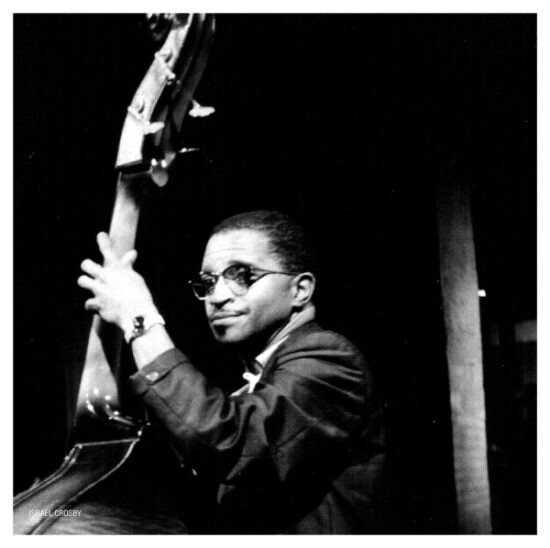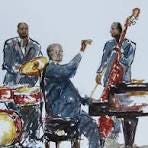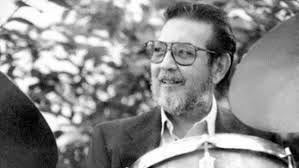After arriving in New York City nearly 47 years ago, the first conversations I can recall having with Sam Jones and Ron Carter, two giants among jazz bassists, had one thing in common. They both called my attention to one of their predecessors, bassist Israel Crosby. For many in our sphere, he is an unsung hero. His only apparent notoriety came from aficionados.
Israel Crosby joined the Ahmad Jamal trio in 1954, replacing bassist Eddie Calhoun. Initially including guitarist Ray Crawford, this lineup marked the beginning of Crosby’s influential tenure with Jamal. The trio's classic formation solidified in 1958 when drummer Vernel Fournier replaced Crawford, creating the iconic piano-bass-drums configuration. Crosby remained a key member until he died in 1962.
Israel Crosby. Many bassists will tell you, “Without him, no me.”
Soon after my early conversations with my mentors, I purchased all of the Ahmad Jamal Trio records that Mr. Crosby performed on. Although he was my initial listening focus, I soon fell in love with the music and personality of that trio. I tried to imagine what it would be like to play in such a musical environment full of suspense, surprise, and magical moments. From then on, I made it my business to hear the Ahmad Jamal Trio every time they appeared in New York City, about three or four times a year.
An artist’s rendition of the maestro conducting from the piano with his patented hand signals.
Some years later, in the late 1980s, I performed with the James Moody Quartet at a summer jazz festival in Perugia, Italy. Several American jazz groups performed over a few days, and we all stayed in the same hotel. We were provided dinners at the hotel, and usually ate outdoors on a large patio adjacent to the hotel. Each day, they would offer a limited supply of pumpkin ravioli in gorgonzola sauce that was to die for! Unless you arrived early, they would run out.
I would arrive early as would Ahmad Jamal and another great musician, drummer Ben Riley. We decided to sit together each evening and share dinner and conversation. It was my first opportunity to get to know either of them. It was a great experience. I was surprised to learn that we rarely talked about music. Instead, the conversation was more general, often discussing current events, travel stories, or occasional reports about our older colleagues going through challenging times. The conversations were laughter-filled, quite animated, and seldom delved into “heavy” subjects. They seemed to be very regular, down-to-earth discussions. I found both men to be engaging and engaged. I stayed in touch with them after that time and would always say hello and get caught up whenever we ran into one another at gigs or on the road.
In 1990, I released my first CD as a leader entitled Tomorrows. As part of that process, I mailed several copies to radio stations, members of the jazz journalism community, and various colleagues I thought might be interested. I sent one to Ahmad. After a couple of months, he called me and was entirely complimentary. He said that my sound confirmed that he wanted to return to using the acoustic bass in his trio, rather than the electric bass guitar he had used for the past several years.
His bassist at the time, James Commack, was an excellent electric bassist who was a marvelous player and possessed extraordinary “radar” that was an essential ingredient of anyone who played in Ahmad’s trio. I greatly respected his ability to make the music feel fantastic and how he enabled Ahmad to take his flights of fancy.
Although I can only speculate, Ahmad may have asked James to play acoustic bass at some point. It would not be a simple conversion for someone new to the acoustic bass, so I assume James was unable or unwilling to do it then. Whatever the reason, Ahmad was looking to hire an acoustic bass player for his trio, and somehow, I got the call.
I believe we had one rehearsal, and shortly after that, we played gigs in nightclubs and concert halls in the United States and Europe. To say that the experience was a dream come true and an extraordinary learning and growth experience would be a gross understatement. It was one of the highlights of my career. Little did I know, the best was yet to come.
Ahmad decided to change the drum chair, which I also thought was needed. But we were amid some quickly approaching engagements, and there was no time to break in a new drummer, so Ahmad called his former associate to fill in. That drummer was from the terrific trio of the late 1950s, who had played with Israel Crosby. It was none other than Vernel Fournier.
Rounding out the classic trio, drummer Vernel Fournier.
Before we played our first engagement as the newly formed trio, Ahmad called a rehearsal to sort of have Vernel brush up on the material he had been so familiar with in the past. As we were rehearsing, I began to feel the same feeling that Israel must have had all those years ago. The beautiful light and low volume swinging of Vernel and the acrobatic escapades of Ahmad. It was like being between a tornado and a gentle sea. I was in heaven and was expected to be the connective tissue bringing it all together.
In the middle of one particular tune, Vernel was doing his usual version of careful observation and reaction when he played one particular subtle figure on the bass drum that could barely be heard, but could be vividly felt. At that instant, Ahmad suddenly quit playing, jumped up from the piano, and released the most joyful scream, saying, “Vernel! You still kill me!!!” And so it was that the unique nature of their bond was revealed to me. The love they had for one another was immediately palpable. I will never forget that day.
After several months and receiving a few phone calls from James seeking my advice concerning acoustic bass matters, James was ready to rejoin the trio at Ahmad’s request. Although I was sad to see my tenure end, the move made perfect sense to me, as James had been with Ahmad for years and was an ideal musical partner for Ahmad.
Ahmad and James, after the transition. Perfect together.
It was an honor and privilege, no less an incredible thrill, to be part of Ahmad Jamal’s trio, if only for about six months as a stand-in while the bass situation worked itself out.
Over the remaining years, I frequently stayed in touch with Ahmad, up until he was in declining health and about to enter that other realm. We had a great relationship that started with me being a fan, then becoming a dinner partner, morphing into his bass player of choice, and finally becoming a friend for life.
I have wanted to document this experience for some time to convey an insider’s view of this fantastic world of jazz music I have been allowed to participate in for the better part of my life.
My friend for life, as I choose to remember him.
TC









What a beautiful story! Full of unique detail, insight, and humility. This is what Substack was made for.
beautiful, thanks for sharing :)